
Great workers deliver the goods. They are also good at managing their manager and other key stakeholders. Sometimes this calls for dealing with challenging situations.
Imagine the scene. You are the Regional Manager for a retail chain. It is 7.00 am on a Monday morning and you are driving North to meet some of your staff. Suddenly your mobile rings. It is the Chief Executive, who says:
“Yesterday I dropped into our biggest store in London. They had failed to order enough of our best selling items.
“The customers were unhappy, the staff were unhappy and I am unhappy. What are we going to do to fix it?”
There are many ways to respond to such as request. One approach is to say:
“I will get onto it straight away. I will make sure that we have enough stock for today and the rest of the week.
“At the same time, I will see what we can do to contact any customers who were disappointed. We can also run a promotion on these items for next weekend.
“Looking to the future, I will ensure that the store staff know how to anticipate demands and get enough stock to satisfy customers.
“I will now make some calls to put everything in place. If appropriate, I may then visit the store. The store team and I will produce ideas to make up for the short fall this week.
“I will ring you back in half an hour to explain the action plan for getting the results. Is that okay?”
Great workers often focus on three themes to manage their managers and other key stakeholders. They take responsibility, reassure people and deliver results. Let’s explore how to make this happen.
Responsibility
Such workers take responsibility. They start by proactively making clear working contracts with their manager and, if appropriate, other key stakeholders.
They clarify the results to achieve – the agreed picture of success;
They keep people informed about the progress towards achieving the picture of success;
They perform superb work and deliver the agreed picture of success.
Such workers are super professional. They take initiatives, get some early successes and keep their stakeholders informed.
Some employees forget this rule and become institutionalised. They stop taking initiatives and wait to be managed.
Many of today’s organisations, however, want people who are positive, proactive and professional. One leader explained this in the following way.
“I want people to step forward. I want them to understand our goals, say how they want to contribute and then deliver on their promises.
“Too many people sit waiting for me to dish out the jobs. That may have worked in the past. But now I want people who show they want to take responsibility.
“This frees me up to take a more strategic role in shaping the business.”
If you wish, try tackling the exercise on this theme. This invites you to do the follow things.
Describe the people you must satisfy in your work. These may include your manager, customers and other key stakeholders.
Describe the specific things you can do to proactively make clear working contracts with these people and show you will take responsibility for achieving the agreed goals.
Reassurance
Bosses often worry. They go to bed at night worrying about hitting the numbers, satisfying their bosses, improving service quality, getting the right people and staying out of trouble.
Similarly, their bosses are under pressure from the banks, stock market or other outside forces. Your job is to reassure them.
Never say: “Trust me.” That is like a red flag to a bull.
Show your manager and other stakeholders that you can be relied upon. Make clear contracts about your contribution, keep them informed and deliver early successes.
Show your leaders that you understand the business. Show them that you are thinking ahead, anticipating issues and have plans in place.
Bosses do not like nasty surprises. When appropriate, describe the potential challenges that lie ahead and your strategies for tackling these issues.
Be honest, especially when faced by potential crises. Show you have considered the possible ways forward, the respective consequences and, where appropriate, give your recommendations.
If you wish, try tackling the exercise on this theme. This invites you to do the follow things.
Describe the people you must satisfy in your work.
Describe the specific things you can do to reassure these people – in a realistic way – that things are under control and progress is being made towards achieving the agreed goals.
Results
Managers and other stakeholders will judge you by the results you deliver. Producing some early successes buys you time. But then you need to deliver the agreed goals.
One soccer coach explained how he had made a fundamental mistake early in his career.
“In sport we talk about building a team, building a club and then building a dynasty. But it is in that order. This is something I learned in my first managerial job.
“I was parachuted into a club in crisis where the Board said they wanted me to build for the long term. I therefore spent a lot of time getting the fundamentals right from the Academy level onwards.
“My strategy should have been to focus entirely on the first team and climb the league table. I could have got some experienced players who would also have developed the youngsters.
“My two years at the club helped to lay the foundations for future managers, who reaped the benefits of the youth policy. But what I failed to do was to show progress at the first team level.
“The Board were under attack from the fans. Despite saying they were committed to long term development, they decided to terminate my contract.
“Now I know it is vital to deliver quick results and build a winning team. This gives you the chance to build a club and then a dynasty.”
How can you satisfy your manager and other key stakeholders? One approach is to agree on the specific goals, perform superb work and achieve the picture of success. You can also do something special to add that touch of class.
If you wish, try tackling the exercise on this theme. This invites you to do the follow things.
Describe the people you must satisfy in your work.
Describe the specific things you can do to deliver the agreed results to people and, if appropriate, add that touch of class.


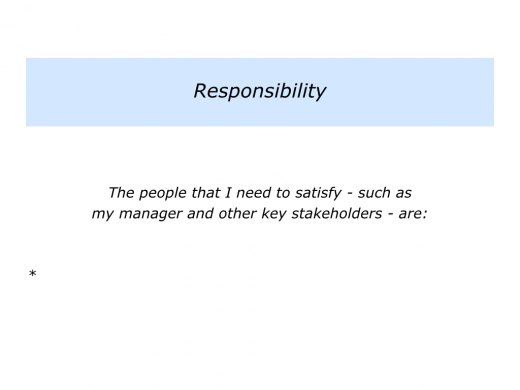
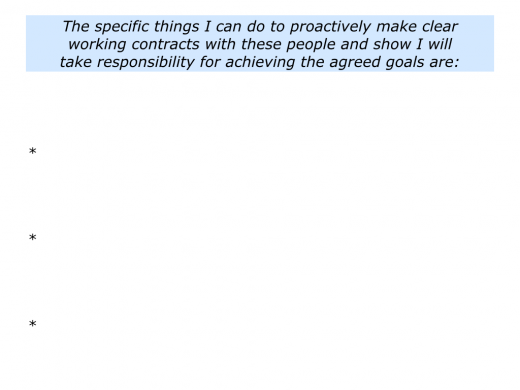
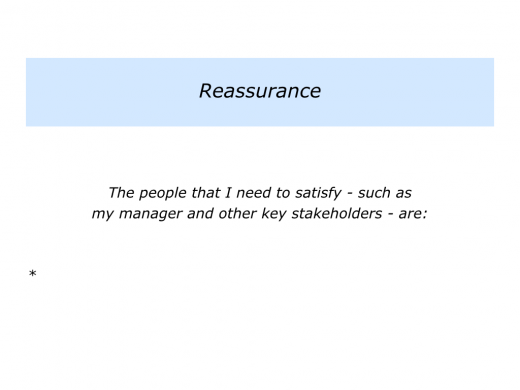
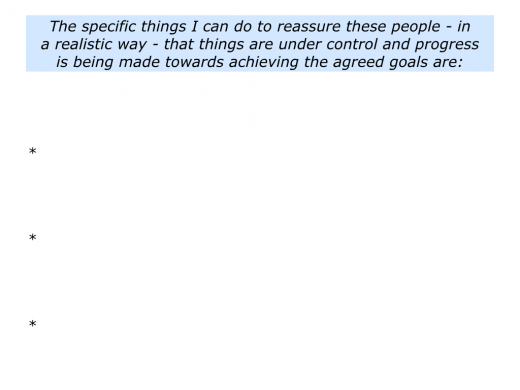
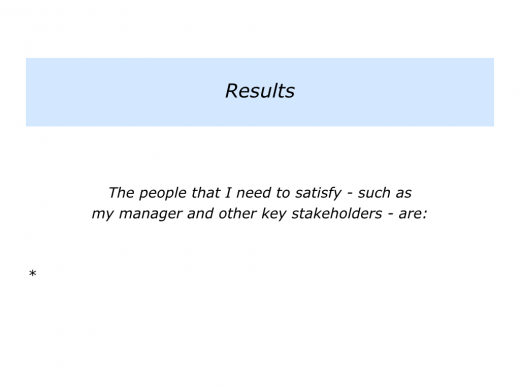
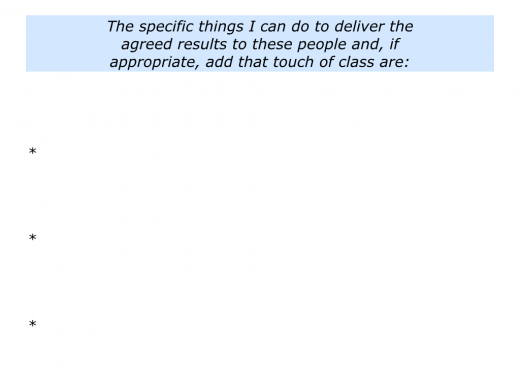




Leave a Reply